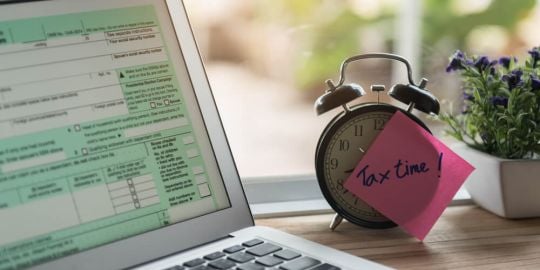Paying tax in Spain
UK tax payer – but now living in Spain full time?
The world of taxation can be very complicated depending upon each individual's financial situation. But let's get some basics clarified for persons who were tax resident in the UK but now living in Spain.
If you are living in excess of 183 days per year in Spain you are automatically considered resident in Spain and you become liable to pay Income Tax in Spain on your worldwide assets.
At present there is no formal system to make you start paying Income Tax in Spain, unless you have a contract of employment and tax is deducted at source on earnings. UK tax will continue to be deducted from pensions, annuities etc. Obviously the UK tax authorities will not pursue you to pay tax in Spain and lose further revenue!
Remember however that other Spanish municipal taxes on owned property and cars will automatically be due and must be paid by everyone.
If you have made the decision that you are in Spain to stay then you should make arrangements to stop paying UK tax and declare your income in Spain. This is sometimes where people become confused as to how they can achieve this.
Spain (like many other countries) has a Double Taxation Treaty with the UK. This means that you are able to apply for UK tax exemption so that you do not end up paying income tax in both countries. Some taxes, for example on any UK rental income, are not automatically exempt and may still have to be paid in the UK where you can continue to claim the relevant personal allowance.
Also, you cannot be granted tax exemption on some pensions paid by Crown authorise such as police and civil servants.
To apply for UK income tax exemption you need to complete the FD9 Spain Individual Form.
You can obtain it from:
UK Inland Revenue ' Centre for Non-Residents
Fitz Roy House
PO Box 46 Nottingham
England NG2 1BD
Or download a copy from www.hmrc.gov.uk. Search on 'FD9' to locate it and there is also lots of other useful information.
The FD9 is in 2 parts ' complete the English section and then the Spanish section which is virtually a copy. You will need to declare all of your income sources otherwise you may have to repeat the process again to achieve exemptions on other pensions etc.
Then you need to take both parts of the FD9 along with '
Copy of Residence card/certificate (if you have one) or Passport
NIE details
Padron (issued by your local town hall)
Your house title deeds (escritura) or rental contract
Copies of water and electricity bills
to your local Spanish tax office for approval - Agencia Estatal de Administracion Tributaria (AEAT) previously known as Hacienda. These tend to be in main towns and cities. Try asking at the town hall if you are unsure of their location.
There will be a department dealing with these applications ' Residencia Fiscal en Espana Convenio. If the AEAT accepts your application they will stamp the FD9 and also issue you with other papers.
Follow the instructions on the FD9 and send it along with the papers you received from the AEAT to the Centre for Non-Residents (address above) and a letter providing any other relevant information to support your application.
They will write to you with any queries or if they accept your application without asking for more information you will receive a confirmation letter. You and the income payer will then be issued with a UK tax code of NT (No Tax).
The income payer will then refund you any tax due to be repaid within the current tax year. Refunds due form the agreed date of departure from the UK to the end of the previous tax year will be repaid by the Inland Revenue.
If you have UK accounts earning interest which will have been taxed at source and paid net of tax you can apply for tax exemption by sending the interest payer direct a completed Inland Revenue Form R105 available as per above. Interest will then be paid to you without tax being deducted. Note not all financial institutions will accept to pay tax gross, they do have an option to opt out of this scheme. In which case you may have to apply to the UK tax office for a refund.
Now having extricated yourself from UK tax (or at least partially, depending on your total income sources) you need to make arrangements to pay Spanish income tax.
If of course you are working in the Spanish system, tax will be deducted at source and you may not have to make a tax declaration depending upon your total income. But for many living on pension income you may have tax to pay on an annual basis and you will need to file a tax declaration unless your income is very low and below the standard allowances.
Often people's initial reaction is that they will end up paying more in Spain because the allowances appear to be much lower than the UK. For some this is possible but at least you will be legal and if you take your total tax liability situation you will be making savings compared to the UK taking into account that council tax and car road fund tax are significantly less in Spain.
The current Spanish tax system has some different types of allowances which the UK does not and many people depending upon personal situations may be very pleasantly surprised at how low their Spanish tax bill works out to be.
You have several choices how to pay ' the system is called Declaracion de Renta (Nothing to do with renting) The Spanish tax year runs as the calendar year ie January 1st ' 31st December. So for 2006s income you will pay in 2007.
Like most Spanish taxes there are set dates for the declaration ' for Income tax it is currently May1st ' June 30th.
You can either visit your AEAT tax office with all of your statements, P60s, etc and deal direct with the tax office or, if your affairs are more complicated it might be best to find a good asesor fiscal or gestoria to help you. Expect to pay around 120 Euros a couple. Don't forget they may save you lots of tax.
Another good option may be to ask your bank if they offer a Declaracion de Renta service and let them complete the papers on your behalf.
Whatever method you choose you will end up with a properly completed tax return having claimed all the allowances you are entitled to. If these are less than your total income, then any tax due will be paid direct from your Spanish bank account.
For tax allowances visit www.spainaccountants.com









